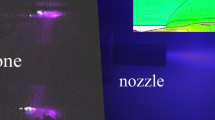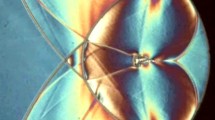Abstract
The spatial flowfield around a model of the re-entry capsule of the Mars Environmental Survey (MESUR) Pathfinder probe afterbody configuration traveling at a speed of Mach 10 was investigated utilizing the electrical discharge method. The shock shape ahead of the capsule was observed using a technique for visualizing 3-D shock shapes, then the streamline following the shock wave was observed utilizing a technique for visualizing streamlines crossing a shock wave. Subsequently, the flowfield behind the capsule was observed by applying a technique for visualizing flow patterns. From these observations, the spatial flow construction including the wake region such as a separation, free shear layer, and rear stagnation location behind the capsule was made clear. These experiments utilizing the electrical discharge method qualitatively demonstrated the spatial flow structure before and behind the hypersonic re-entry capsule, which had been very difficult to visualize. These experiments were carried out by using a pulsed facility of 18 ms duration.
Similar content being viewed by others
References
Dogra, V. K., and Moss, J. N. and Price, J. M., Near-Wake Structure for a Generic Configuration of Aeroassisted Space Transfer Vehicles, J. Spacecraft and Rockets, 31-6 (1994), 953–959.
Dogra, V. K., Moss, J. N., Wilmoth, R. G., Taylor, J. C. and Hassan, H. A., Effects of Chemistry on Blunt-Body Wake Structure, AIAA J., 33-3 (1995), 463–469.
Gnoffo, P. A., Braun, R. D., Weilmuenster, K. J., Mitcheltree, R. A. Engelund, W. C. and Powell, R. W., Prediction and Validation of Mars Pathfinder Hypersonic Aerodynamics Database, J. Spacecraft and Rockets, 36-3 (1999), 367–373.
Grasso, F. and Pettinelli, C., Analysis of Laminar Near-Wake Hypersonic Flows, J. Spacecraft and Rockets, 32-6 (1996), 970–980.
Grasso, F. and Pirozzoli, S., Nonequilibrium Effects in Near-Wake Ionizing Flows, AIAA J., 35-7 (1997), 1151–1163.
Hollis, B. R. and Perkins, J. N., Transition Effects on Heating in the Wake of a Blunt Body, J. Spacecraft and Rockets, 36-5 (1999), 668–674.
Ivanov, M. S., Markelov, G. N., Gimelshein, S. F., Mishina, L. V., Krylov, A. N. and Grechko, N. V., High-Altitude Capsule Aerodynamics with Real Gas Effects, J. Spacecraft and Rockets, 35-1 (1998), 16–22.
Larigaldie, S., Bize, D., Mohamed, A. K., Ory, M. Soutade,J. and Taran, J. P., Velocity Measurement in Hypersonic Electron-Beam-Assisted Glow Discharge. AIAA J., 36-6 (1998), 1061–1064.
Mitcheltree, R. A., Moss, J. N., Cheatwood, F. M., Greene, F. A. and Braun, R. D., Aerodynamics of the Mars Microprobe Entry Vehicles. J. Spacecraft and Rockets., 36-3 (1999), 392–398.
Mitcheltree, R. A. and Gnoffo, P. A., Wake Flow About the Mars Pathfinder Entry Vehicle, J. Spacecraft and Rockets, 32-5 (1995), 771–776.
Moss, J. N., Blanchard, R. C., Wilmoth, R. G. and Braun, R. D., Mars Pathfinder Rarefied Aerodynamics: Computations and Measurements, J. Spacecraft and Rockets, 36-3 (1999), 330–339.
Moss, J. N., Wilmoth, R. G. and Price, J. M., Direct Simulation Monte Carlo Calculations of Aerothermodynamics for Mars Microprobe Capsules, J. Spacecraft and Rockets, 36-3 (1999), 399–404.
Nishio, M., New Method for Visualizing Three-Dimensional Shock Shapes Around Hypersonic Vehicles Using an Electric Discharge, AIAA J., 28-12 (1990), 2085–2091.
Nishio, M., Qualitative Model for Visualizing Shock Shapes, AIAA J., 30-9 (1992), 2346–2348.
Nishio, M., Methods for Visualizing Hypersonic Shock-Wave/Boundary -Layer Interaction Using Electric Discharge, AIAA J., 34-7 (1996), 1464–1467.
Nishio, M., Method for Visualizing Streamlines Around Hypersonic Vehicle by Using Electrical Discharge. AIAA J., 30-6 (1992), 1662–1663.
Nishio, M. and Hagiwara,T., Hypersonic Flowfield Analysis of X-33 Model with the Electric Discharge Method, J. Spacecraft and Rockets, 36-6 (1999), 784–787.
Author information
Authors and Affiliations
Corresponding author
Additional information
Masatomi Nishio: He received his doctor degree from Kobe University. He has been interested in hypersonic flow visualization, and has developed the Electrical Discharge Method for visualizing 3-D hypersonic flow phenomena. He is a professor of Fukuyama University in Japan.
Shinji Sezaki: He is a Ph. D. candidate in Department of Mechanical Engineering at Fukuyama University, Japan. He received his M.S. degree in 2001 from Fukuyama University. His research interests are flow visualizations around hypersonic vehicles by using Electrical Discharge Method.
Hiroaki Nakamura: He is a Ph. D. candidate in the school of Design and Production Engineering at Fukuyama University, Fukuyama, Japan. He received his M.Eng. degree in 2002 from the Department of Mechanical Engineering, Fukuyama University.
Rights and permissions
About this article
Cite this article
Nishio, M., Sezaki, S. & Nakamura, H. Visualization of flow structure around a hypersonic re-entry capsule using the electrical discharge method. J Vis 7, 151–158 (2004). https://doi.org/10.1007/BF03181588
Received:
Revised:
Issue Date:
DOI: https://doi.org/10.1007/BF03181588




